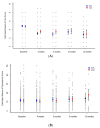Effect of Early Management on Pain and Depression in Patients with Pancreatobiliary Cancer: A Randomized Clinical Trial
- PMID: 30641928
- PMCID: PMC6356375
- DOI: 10.3390/cancers11010079
Effect of Early Management on Pain and Depression in Patients with Pancreatobiliary Cancer: A Randomized Clinical Trial
Abstract
Background: The present study assessed whether early palliative care (EPC) targeting pain and depression and automated symptom monitoring could improve symptoms in patients with advanced pancreatobiliary cancer. Methods: Patients diagnosed with pathologically confirmed locally advanced or metastatic pancreatic or biliary tract cancer who had cancer-related pain (brief pain inventory (BPI) worst pain score >3) and/or depression (Center for Epidemiological Studies-Depression Scale (CES-D) >16) were randomized within 8 weeks after diagnosis to receive EPC or on-demand palliative care (n = 144 each). EPC included (1) nursing assessment of pain and depression, (2) pain control based on National Comprehensive Cancer Network guidelines, (3) depression control by psychoeducation and/or consultation with a psychiatric specialist, and (4) patient education. The primary end points were ≥50% reductions from baseline to week 4 in pain and depression scores. Results: The proportion of patients in the EPC and usual care groups with ≥50% reductions in pain (29.5% vs. 25.2%; p = 0.4194) and depression (30.8% vs. 36.8%; p = 0.5732) scores from baseline to week 4 did not differ significantly. The proportion of patients with BPI worst pain score ≤3 was significantly higher (51.1% vs. 38.9%, p = 0.0404) and the reduction in pain intensity score significantly greater (1.5 vs. 1.0 points, p = 0.0318) in the EPC than in the usual care group. At 4 weeks, patients in the EPC group reported significant increases in global health status, role of functioning, nausea and vomiting, and pain scores on the European Organization for Research and Treatment of Cancer Core Quality of Life questionnaire (EORTC QLQ-C30) general questionnaire. Conclusions: Although the primary outcome was not met, this trial indicates that EPC may improve early pain relief in patients with advanced pancreatobiliary cancers.
Keywords: biliary tract cancer; depression; pain; palliative care; pancreatic cancer.
Conflict of interest statement
The authors indicated no potential conflicts of interest.
Figures



References
-
- Smyth E.N., Bapat B., Ball D.E., Andre T., Kaye J.A. Metastatic pancreatic adenocarcinoma treatment patterns, health care resource use, and outcomes in France and the United Kingdom between 2009 and 2012: A retrospectivesStudy. Clin. Ther. 2015;37:1301–1316. doi: 10.1016/j.clinthera.2015.03.016. - DOI - PubMed
-
- American Academy of Hospice and Palliative Medicine. Center to Advance Palliative Care. Hospice and Palliative Nurses Association. Last Acts Partnership. National Hospice and Palliative Care Organization National Consensus Project for Quality Palliative Care: Clinical Practice Guidelines for quality palliative care, executive summary. J. Palliat. Med. 2004;7:611–627. doi: 10.1089/jpm.2004.7.611. - DOI - PubMed
-
- Temel J.S., Greer J.A., El-Jawahri A., Pirl W.F., Park E.R., Jackson V.A., Back A.L., Kamdar M., Jacobsen J., Chittenden E.H., et al. Effects of early integrated palliative care in patients with lung and gastrointestinal cancer: A randomized clinical trial. J. Clin. Oncol. 2017;35:834–841. doi: 10.1200/JCO.2016.70.5046. - DOI - PMC - PubMed
Grants and funding
LinkOut - more resources
Full Text Sources
Miscellaneous

